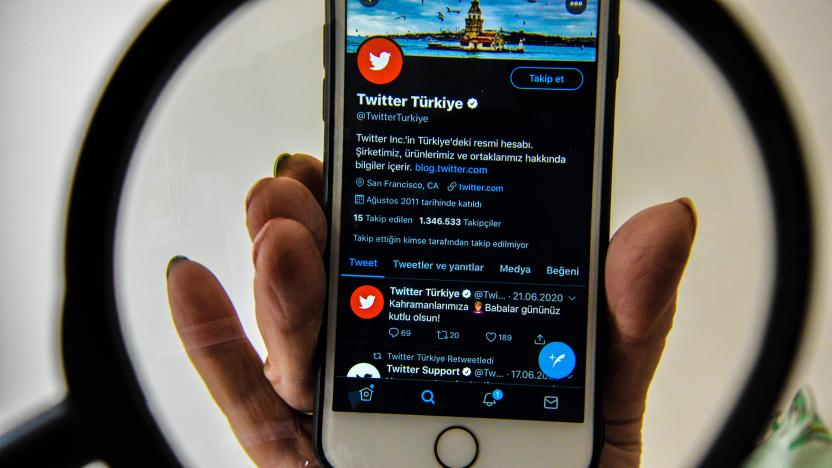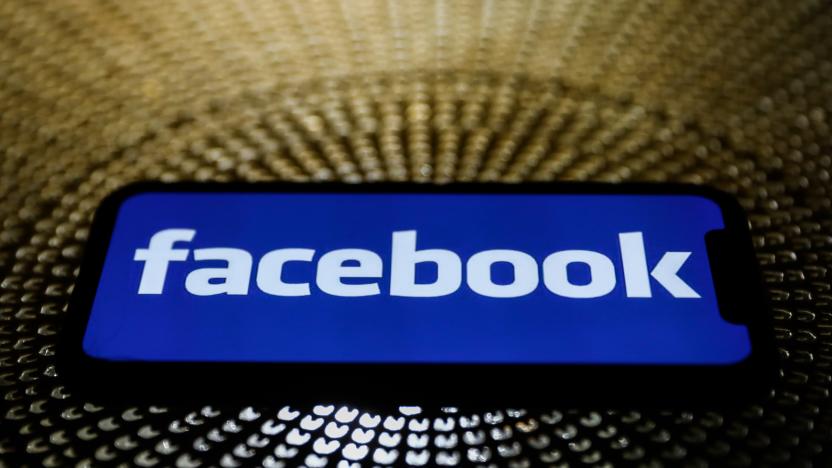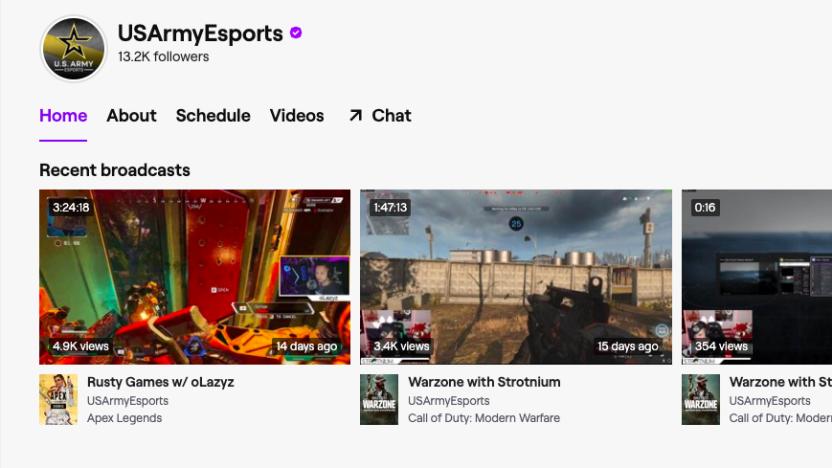freedom of speech
Latest

Twitter creates an entity in Turkey to obey a social media law
Twitter has set up a legal body in Turkey to comply with a social media law, but there are concerns this might have consequences for privacy and freedom of speech.

Facebook's first Oversight Board cases tackle hate speech and misinformation
Facebook's Oversight Board has revealed its first cases, and most of them focus on thorny hate speech issues.

Army pauses recruiting on Twitch after First Amendment criticism
The US Army has paused activity on its Twitch account after drawing criticism from First Amendment groups for banning a user who asked about war crimes during a livestream. The user, activist Jordan Uhl, subsequently wrote an article for The Nation criticizing the Army, Navy and Air Force for using Twitch as a recruitment method. Wednesday, Rep. Alexandria Ocasio-Cortez told Vice she plans to file a measure that would prevent the military from using Twitch and similar platforms for recruiting.

Former Google exec says he was pushed out for defending human rights
Google's former global head of international relations claims he was pushed out of the company for trying to protect free expression and privacy in China. In a letter shared today, Ross LaJeunesse says that, after 11 years of working to protect human rights in China, he was told there was no longer a job for him as a result of "reorganization." He says the company has strayed from its "don't be evil" motto, and rather than take a lesser role, he's leaving to run for a Senate seat in Maine.

Turkey's Constitutional Court: Twitter ban violates freedom of speech
Since Turkey blocked access to Twitter in late March -- in response to posts about the prime minister's alleged corruption -- there's been plenty of legal back-and-forth, with the ban even being lifted temporarily as judges weighed complaints against the government. Today's news might mean Twitter is back for good: The Constitutional Court ruled that blocking the social-media platform was unconstitutional on the grounds that it violates the right to free speech. Most importantly, the ruling requires Turkey to immediately restore access to Twitter. According to the Hurriyet Daily News, this ruling may be used as a precedent for similar cases in the future, possibly preventing authorities from imposing widespread bans like this again. It's unclear whether this ruling will also affect the country's ban on YouTube, which is currently in effect. In response to the ruling, Twitter's @Policy account tweeted: "We welcome this Constitutional Court ruling, and hope to have Twitter access restored in Turkey soon."

Twitter warned by Indian government to kibosh inflammatory tweets
India's in the midst of a security crisis and has asked Twitter to curtail "inflammatory messages" or prepare to face legal action, according to the Times of India. The country has shut down numerous websites, while Google and Facebook have already pledged to remove any threatening content. Officials reportedly said that Twitter "failed to cooperate" in efforts to curb messages or help the government find their source, despite an earlier pledge by the social network to censor content when a country demanded it. Indian ISPs have started blocking the service's accounts, according to TNW, but not Twitter itself, as the site first reported. In any case, the country still has a long way to go to catch the censorship leader.

Internet Defense League forms with support of EFF and Mozilla, bills self as 'bat signal' of the web
It looks like the Dark Knight Rises hysteria is affecting more than just spoiler-averse fans. Billing itself as the "internet's bat signal," the newly formed Internet Defense League is a collective of companies, websites and non-profit groups-- including the EFF, Mozilla, Reddit and WordPress -- banding together to nip future SOPAs and PIPAs in the bud. The IDL will officially launch today, and according to its website it's enlisting web denizens to sign up and "broadcast an action" when net freedoms appear to be under threat. The League is really milking that Batman metaphor to full effect; it will broadcast its logo, a cat that looks plenty eager to tackle all foes of speech, into the sky in five cities around the world, including, interestingly, Ulan Bator, Mongolia.

Twitter to begin 'reactively' censoring tweets in specific countries, still no love for China
It's no secret that certain countries have different views over freedom of expression on the internet, but this hasn't stopped Twitter's attempt to keep its service running in as many places as possible. In its latest blog post, the microblogging service announced that it'll begin "to reactively withhold content from users in a specific country" when required, in order to keep said content available to all users elsewhere (as opposed to blocking it globally). The withheld tweets will be marked accordingly while their authors get notified with reasons where possible, and internet legal rights monitor Chilling Effects will also post the relevant take-down notices on a dedicated page.This may seem like some form of censorship taking over Twitter, but the company only mentioned those of "historical or cultural reasons" like the ban of pro-Nazi content in France and Germany; so it's not clear whether Twitter will also handle similarly with tweets that potentially lead to events such as the UK riots last year. Even though Twitter didn't elaborate further for Reuters, there is one reassuring line in the post: "Some [countries] differ so much from our ideas that we will not be able to exist there."One such country is most likely China, and back at AsiaD in October, Twitter CEO Jack Dorsey told us that there's simply no way for his company to work with the Chinese government (you can watch him answering us at 38:17 in the video -- courtesy of All Things D -- after the break): "The unfortunate fact is we're just not allowed to compete in this market, and that's not up to us to change. The person to ask is trade experts between both governments, but at the end of the day we can't compete. They (Chinese microblogging platforms) can compete in our markets, and we're certainly interested in what that means for us... We would love to have a strong Twitter in China, but we'd need to be allowed to do that."There are obviously many factors that add up to this sour relationship, but the contradiction between China's strict internet monitoring policy and Twitter's core values is most likely the biggest obstacle. And of course, the Chinese government would favor its home-grown tech properties, anyway. That said, several months ago, one of the country's largest microblogging services Sina Weibo was criticized by the authorities for not censoring fast enough, so it's obvious that it'd be even trickier to work with a foreign company that sees things differently. Things are unlikely to change any time soon, or ever, unless China relaxes its policy.

The SOPAbox: Defeating online piracy by destroying the internet
Disclaimer: The Soapbox column is entirely the opinion of this week's writer and does not necessarily reflect the views of Massively as a whole. If you're afraid of opinions other than your own, you might want to skip this column. Unless you've been living under a rock, chances are you've heard of SOPA and PIPA. The Stop Online Piracy Act and PROTECT IP Act are two radical pieces of copyright legislation currently being pushed through the US government. Although the stated intent of the new legislation is to provide companies with additional tools with which to combat piracy, the bill's loose wording has raised some serious alarm bells. Opponents to the proposed law say it would give corporations the ability to shut down any almost any website under the guise of protecting copyright infringement. Gamers will be affected worst of all, as the loose wording of the law makes any website with user-submitted content potentially vulnerable to a shut down order. That could include YouTube, Facebook, Twitter, any blog with a comment section, or even any online game with a chat system. Perhaps the scariest part is that you'll be affected even if you're not in the US, as one of the new law's enforcement mechanisms is to remove a site from the DNS records, a move that assumes the US has jurisdiction over the global Domain Name System. AOL is among many huge companies strongly opposing SOPA, and so naturally Massively opposes it too. In this week's massive two-page Soapbox, I make the case for why you should be worried about SOPA, and I suggest what can be done to tackle piracy in the games industry. Comments can be left on page two.

UK Gov wants opt-in system for adult material, imagine a boot stamping on a trackpad, forever
Looks like Prime Minister David Cameron's not content with just shuttering the internet during social unrest (whilst condemning others who do the same). He's declared that four of the UK's biggest ISPs have entered into an opt-in system for adult material. The move is backed by the Mothers Union but has been flatly denied by the ISPs, who insist they're offering McAfee parental controls with new signups rather than Government-level web filtering. (Probably a massive let down to those eagerly waiting to delegate their parental responsibilities.) Of course, given the flaky nature of web filtering, any sanguine word that contained an expletive (the word "arsenal", for example) could be impossible to access until you had an awkward conversation with someone over the phone.

Wiretapping Act could spell 'finito' for Italian Wikipedia
This week, lawmakers in Italy are debating a controversial new bill that could have disastrous implications for Wikipedia. Yesterday, the encyclopedia posted a lengthy letter on its Italian portal, informing visitors that the site may be shuttered within the country if parliament passes the proposed DDL Intercettazioni, or "Wiretapping Law." If ratified, the legislation would require all online publishers to amend any content considered objectionable or defamatory within 48 hours of receiving a complaint. Offenders would face a fine of €12,000 (about $16,000), and any requested corrections would not be subject to review. Of course, this presents obvious problems for the crowdsourced (and crowd-edited) Wikipedia, which characterized the law as "an unacceptable restriction of [its] freedom and independence." The site took particular umbrage at the bill's apparent disregard for third-party review, pointing out that the "opinion of the person allegedly injured is all that is required" to force a re-write, "regardless of the truthfulness of the information deemed as offensive, and its sources." At the moment, the portal is still up, but masked by Wikipedia's letter. If the Wiretapping Law progresses further, however, the organization says it will have no choice but to delete its Italian platform altogether. [Image courtesy of Toutlecine]

UK teen arrested for illegal BBM, social media crackdown gains steam
Lending further gravity to the proposed crackdown being bandied about in British parliament, an Essex teen has been arrested for sending a BBM that ran afoul of the Serious Crime Act of 2007. The 18-year old, now free on bail, allegedly used the service to encourage copycat attacks of the violent rioting that's swept London, and is set to appear in court on September 1st. It's the second known case to put RIM's private messaging service -- "popular among urban teenagers" as a cheap texting alternative -- in the UK's legal hotseat. For its part, the Canadian electronics maker has since reached out to police, promising to aid the investigation "in any way [it] can." Although no decision has yet been made to extend law enforcement's powers over social media services, such as Twitter and Facebook, arrests like these seem to indicate a murky free speech future.

UK Prime Minister exploring social media crackdown in wake of London riots (video)
As Londoners continue to pick up the rubble and carnage from this week's riots, UK Prime Minister David Cameron is exploring new ways to maintain order -- including, apparently, a government crackdown on social media. In a speech to members of Parliament today, Cameron made clear his belief that law enforcement officials should be able to curb and monitor the use of social networking sites under certain circumstances, lending credence to the theory that mechanisms like Facebook, Twitter and BlackBerry played a critical role in inciting the recent violence: "Free flow of information can be used for good. But it can also be used for ill. And when people are using social media for violence we need to stop them. So we are working with the Police, the intelligence services and industry to look at whether it would be right to stop people communicating via these websites and services when we know they are plotting violence, disorder and criminality." There's a fine line separating issues of national security from the rights to free speech, but it's a line that Cameron seems willing to toe. And, though he and his Conservative government are only mulling the idea, it's difficult to ignore the irony in his statements. Keep in mind that this is the same man who roundly condemned Hosni Mubarak for shutting down Egypt's internet at the height of its revolution, calling for the now-ousted leader to fully respect the "freedom of expression and communication, including use of telephones and the internet." Cameron, of course, isn't calling for anything nearly as drastic as what Mubarak orchestrated, nor is he facing anywhere near the same level of domestic turmoil. But the fundamental narrative remains the same: in the face of social upheaval, a national leader instinctively reaches for a digital muzzle as a stop-gap measure, while (perhaps) ignoring the larger, longer-term ramifications of his actions. Fortunately for the UK, though, Cameron is already doing one thing that Mubarak apparently never did -- he's thinking about right and wrong. Head past the break to see Cameron's speech, in its entirety.

Tim Berners-Lee entreats us to keep the net neutral, standards open, and speech free
We've always thought pretty highly of this Tim Berners-Lee fella, and now we've got a whole essay penned by him to show you why that is. In a six-page treatise on the current state of the web, Tim discusses why universality of access is so important to our freedom of speech and other democratic liberties, why open standards will always prevail over closed ecosystems (with a special critique of Apple's iTunes and concordant appification of the web), and also why it's necessary to distinguish between the web and the internet. Oh, and he also manages to squeeze in one of the most succinct explanations of net neutrality and its growing importance in our massively interconnected world. Hit the source for the full shot of enlightenment. [Image courtesy of Paul Clarke]

The internet earns a nomination for 2010 Nobel Prize
Isn't Italy a place of contrast? After the country's judiciary slammed Google for failing to keep a tight enough leash on user-uploaded content, we're now hearing that its local version of Wired magazine is putting forward the internet as a candidate for the Nobel Peace Prize in recognition of its contributions to "helping advance dialogue, debate and consensus." Right then. Just in case you think this is all a bit silly -- and you should -- we're also hearing Nicholas Negroponte and 2003 Nobel laureate Shirin Ebadi are both in support of the idea, which has been described as "a Nobel for each and every one of us" by Internet for Peace, an organization set up specifically to promote the web's candidacy. That's a pretty succinct way of putting it, but it also shows what's wrong with the idea: nothing devalues a prize's worth and meaning quite like handing it out to everyone. Just imagine icanhascheezburger.com slapping a legitimate Nobel laureate badge up on its homepage and you'll know what we mean.

[1.Local]: The relative value of being "First!"
Reader comments -- ahh, yes, the juicy goodness following a meaty post. [1.Local] ducks past the swinging doors to see what readers have been chatting about in the back room over the past week. Hang on, guys, while I reach back for my Drama Mamas hat ... Just a sec, turning on my helm display ... There. Ok, here's the score: I delete all "First!" comments on my posts, so readers don't have to wade through nonsense posts simply to get a shot at making relevant conversation. Those who persist get hit with the Hammer of Ban Justice. (Don't say you haven't been warned!) Off-topic comments are pointless and rude, and they achieve nothing but demonstrating how spectacularly clueless you are on how to comport yourself in public on the internet. Don't do it, please. /unequip [Drama Mama Helm] Ok, now that that's on the record -- shhh, c'mere. Peek around the corner with me, because this "First!" on a recent Around Azeroth turned out to be rather entertaining. (Just don't tell anyone it was me who told you so.)

Why you don't have freedom of speech in WoW
digg_url = 'http://digg.com/playable_web_games/Do_You_Have_Freedom_of_Speech_in_WoW'; Freedom of speech is one of the most often quoted rights by gamers and people online, yet it is sadly one of the most misunderstood. This right comes about regularly when people are discussing forum bans, moderation, and people like Ghostcrawler telling folks they need to behave. People think that just because they live in a democracy or free society that they have an innate right to do and say whatever they want wherever they want. Nothing could be further from the truth. In a private forum, such as the official World of Warcraft forums, or on a site like WoW.com, you don't have any inherent right to do anything. The people running the site or designing the game sets the rules, and that's that. If Blizzard says all communication must end with "Ni!" or you're banned from their forums, then that's the rule you must follow. It's their property and their choice to do that. If we say every comment must make fun of gnomes or the commenter will be banned, then that's the rule you must follow. It's our website. Freedom of speech has absolutely no bearing within a private organization. When you accept WoW's Terms of Service or use a website like WoW.com, you agree to abide by the organization's rules. If you don't follow those rules, or if someone in the organization just wakes up on the wrong side of the bed that day, you can be prohibited from returning to the forums or playing the game.

LGJ: Is game censorship the new trade barrier?
Each week Mark Methenitis contributes Law of the Game on Joystiq ("LGJ"), a column on legal issues as they relate to video games: Thinking about the recent rash of international game censorship issues, I noticed a pattern: Games banned abroad are almost exclusively American (having, at least, significant ties to US companies). Games don't tend to be banned in the countries where their respective developers and publishers are located. So, does this speak to the attitudes of the country and free speech? Or, is it a ruse for creating a trade barrier? More importantly, could an entire trade war arise from video game content restrictions?There's a fair amount of groundwork that goes into understanding this discussion, unfortunately, but it's a topic that needs to be discussed.First, there are two major areas of the law that need to be understood: international free speech regulations and international trade regulations. I know regulatory discussion is less than fascinating, so allow me to present you with the short and sweet version.

Postal 2 to be featured in Nobel Prize museum
We'd wager that the first time the gaming community collectively booted up Running With Scissors' Gary Coleman-rich urination sim, Postal 2, we all shared the same thought: that this game absolutely needs to be showcased in some sort of museum commemorating mankind's greatest accomplishments. If memory serves, many of the title's reviews included similar sentiments.Finally, that observation is being realized. Sweden's Nobel Museum, whose galleries are littered with installations denoting the achievements of Nobel laureates (as well as the life of the prize's progenitor, Alfred Nobel), will be including Postal 2 in a new exhibit titled "Freedom of Speech: How Free is Free?" The game will be included in a section that focuses on censorship in the video game industry. We're really happy such an exhibit exists; we just wish they'd picked a ... well, a good controversial game.

Law of the Game on Joystiq: No Freedom of Trash Talk
Each week Mark Methenitis contributes Law of the Game on Joystiq, a column on legal issues as they relate to video games: In a recent Sessler's Soapbox, Adam took the opportunity to comment on some of the trash talking on Xbox Live. During the course of that diatribe, he mentioned that he thought the First Amendment argument was a "crock of s***" with respect to trash talking. Well, as the resident lawyer here on Joystiq, I'd like to take this opportunity to explain the First Amendment argument is just flat out wrong. In fact, it's one of my greatest pet peeves that the First Amendment gets thrown about as an excuse for most everything that is said in the realms of gamer culture, from trash talking in online matches, to posts on forums, to comments on gaming blogs. In case you're one of the thirty-four people worldwide who has never experienced the phenomenon in question, this is essentially what's being talked about: Typically, someone will do something offensive online, be that posting something in a forum or saying something on Xbox Live. Then, someone in power will either reprimand that user, often through censoring, or banning for the behavior. This is typically either followed by that user or some other user decrying this exercise of authority as a violation of their 'rights.' The responses do vary, but as a moderator of one of the biggest forums on the internet, I've seen everything from 'OMG U R VIOL8ING MY FURST AMNDMT RYTES!!!11!' to some very lengthy and polished answers. The only commonality between these varying levels of responses is that they are all wrong.










